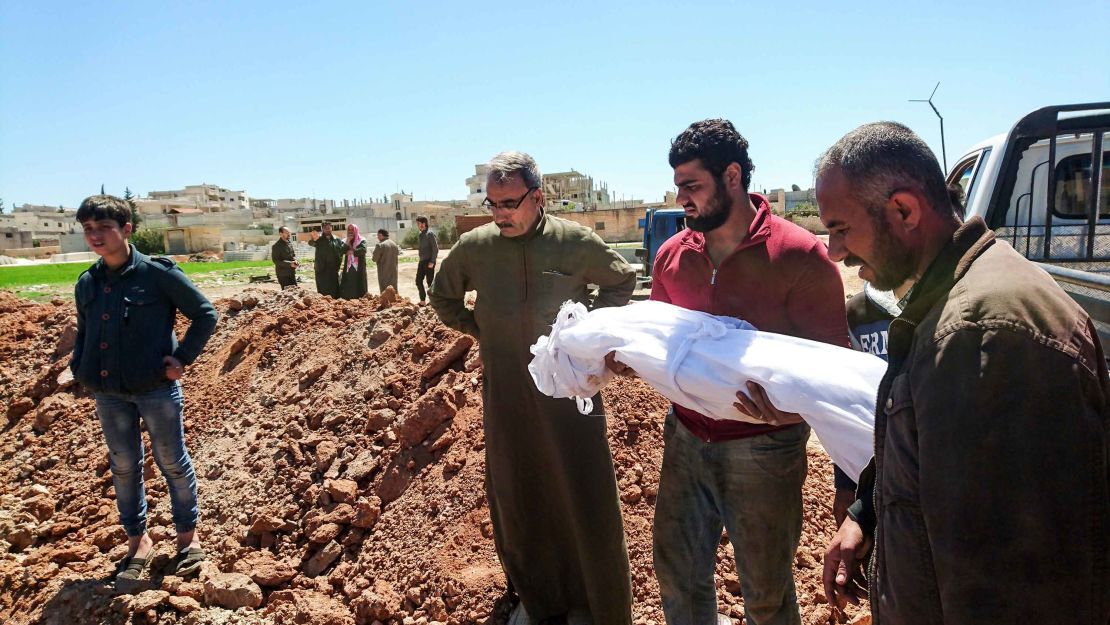Story highlights
Putin claims that a chemical attack in Syria was staged
He thinks Syria's Assad regime will be framed for future attacks
Russian President Vladimir Putin has suggested that unnamed forces inside Syria are plotting to carry out chemical attacks and frame the regime of Syrian President Bashar al-Assad for them.
Putin’s comments come during a major diplomatic rift with the United States over a gas attack last week that killed 89 people in Syria’s Idlib province.
The White House has accused Syria and Russia, Assad’s most powerful ally, of launching a confusion campaign over who was responsible for the attack, in order to protect Assad’s regime. Syria and Russia have vehemently denied the regime carried out the attack.
“We have information from a variety of sources that such provocations … are being prepared in other parts of Syria, including in southern suburbs of Damascus,” Putin said Tuesday during a news conference with Italian President Sergio Mattarella.
“They plan to use some substances and accuse the Syrian government of using those chemicals. We believe every incident should be properly investigated,” he said.
Full coverage
Putin did not say whom he thought was behind the planned attacks, but he made the comments in response to a question on the likelihood of further US military strikes against Syria.
In response to last week’s chemical attack in the rebel-held town of Khan Sheikhoun, the US fired 59 Tomahawk missiles against the Shayrat airfield on Friday, in the country’s first strike against the regime since the war broke out six years ago.
Putin repeated those suggestions in an interview on Wednesday with the state-run MIR television station, in which he said the chemical attack last week had been staged and implied that he knew who was planning the alleged future attacks.

“But in order to give a definitive answer, we need to thoroughly investigate this event, and there is no other way, which is what we propose to do,” he said, according to a transcript of the interview.
He said earlier he would ask The Hague and the international community to investigate the allegations.
In the same interview, to be aired in full later Wednesday, he said several states had been “nodding like bobbleheads without analyzing the events.”
He went on to say that the US missile strike on the Syrian air base was “a clear violation of international law.”
“Everyone [NATO members] agrees to it, accepts it and start nodding and expressing their support,” he said.

Russia-US relations plunge
The chemical attack has widened the wedge between the US and Russia, both of which had expressed hope for a reset in relations following the election of US President Donald Trump.
Putin said relations had worsened.
“The working level of confidence in Russian-American relations, especially at the military level, under the administration of Donald Trump has not improved, but rather worsened,” he told MIR.
In the briefing Tuesday, Putin suggested that Russia and Syria were being demonized.
“Everyone wants to restore relations in the Western community after – thanks to the former US administration – many European countries adopted an anti-Trump position during the election campaign,” he said.
“Syria and Russia, as a common enemy, provide a wonderful platform for consolidation. We are ready to put up with that for a while in the hope that it will eventually lead us to some positive trend based on interaction.”
Putin said the US was using the same tactic it did in the lead-up to the Iraq war.
“This reminds me very much of the events of 2003, when US representatives in the Security Council showed alleged chemical weapons discovered in Iraq. A military campaign in Iraq ensued, which ended with the destruction of the country, an increased terrorist threat and the emergence of ISIS on the international scene,” Putin said. “The exact same thing is happening now, and their partners are nodding approvingly.”
Mixed messages from the US
To add to the confusion surrounding the attack, White House officials have sent mixed messages on their positions on Assad.
During his campaign, Trump said he was open to cooperating with Russia on Syria and that removing Assad was not a priority. Nikki Haley, the US Ambassador to the United Nations, had expressed the same sentiment before the chemical attack.
But some senior officials in the Trump administration, including Haley, now say that Assad must go.
US Secretary of State Rex Tillerson, who is in Moscow meeting with his Russian counterpart, has taken a softer line, saying he “hoped” the Syrian people would choose to oust Assad from power.
President Trump said that the images of the attack’s aftermath moved him to act, launching the Tomahawk strike on the airbase from where the US believes the planes took off to carry out the attack.
US Defense Secretary James Mattis said the airstrike had destroyed 20% of the Syrian government’s operational aircraft.
The Russian Defense Ministry said Wednesday that those strikes were not as effective as the US claims. “Figures sounded by the Pentagon of supposedly high efficiency of massive missile attack on Shayrat Air Force Base are made for the American public, not for professionals,” according to a statement posted on the Defense Ministry’s Facebook page.
CNN’s Angela Dewan, Sebastian Shukla and Alexander Felton contributed to this report.









